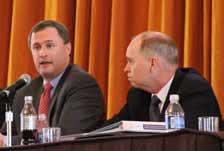American farmers are producing at record levels, and international customers are purchasing more than ever. But the question is: can our nation’s transportation system move grain from farm to port with the speed and efficiency that today’s international trade demands? The answer is rapidly becoming a glaring “NO.�
Surplus Masked Inefficiency
For decades, U.S. farmers raised more grain than global customers were buying, so the nation could live with inefficiencies in moving it to port via truck, rail or barge. By 2002, however, world demand decreased the surplus, and U.S. infrastructure deficiencies started to become more apparent – and problematic.
The United States must place greater priority on the movement of freight because the aging U.S. transportation system is not keeping up with today’s pace of international trade, according to two infrastructure experts who addressed the U.S. Grains Council International Marketing Conference & Annual Membership Meeting Feb. 8 in New Orleans.
Wake Up Call on Infrastructure
Kurt Nagle, CEO of the American Association of Port Authorities, and Ken Eriksen, senior vice president at Informa Economics, said the country needs a wake up call on its infrastructure.
“A nation is judged by its infrastructure, and the United States is getting worse by the year, if not the day,� Nagle said, whose organization represents 160 port authorities in the Western Hemisphere.
“We need an attitude adjustment about infrastructure,� Eriksen said. In a world where communication is instantaneous, and overnight delivery of packages is standard operating procedure, transportation of freight is not keeping up.
“Developing countries are seeing the opportunity that upgrading their infrastructure can bring, and many are putting higher priority on their infrastructure than we are,� he said.
Nagle showed statistics that Singapore, Brazil, Japan and the European Union all spend more per capita on infrastructure improvement than the United States.
Panama Expansion Means Bigger Ships
When the expansion of the Panama Canal is complete in time to mark its 100th anniversary in 2014, it will have locks that accommodate vessels up to 1,200 feet long, 160 feet wide and with a draft of 50 feet. The canal now handles vessels no larger than 965 feet long, 106 feet wide and with a draft of 39.5 feet.
“But unless the United States does a better job of maintaining its navigation channels through dredging and improvement of its locks and dams, our channel dimensions will not keep pace with larger ships,� Nagle said. “And we will not realize the full advantage of the export opportunities the expanded Panama Canal will bring. The lower Mississippi River is a poster child of the inadequate maintenance of federal navigation channels.�
Exports Mean US Jobs, Global Competitiveness
The speakers both emphasized that international trade creates and maintains American jobs and that it is shortsighted for the United States not to have an infrastructure that takes full advantage of the growing economic potential that world trade represents. Nagle said that seaports support 13 million jobs, and every billion dollars in exports means 15,000 jobs.
“Free trade creates jobs,� Eriksen said. “Farmers spend months every year raising and taking care of the pile of grain you produce, but you don’t recognize the full value of your grain until it is transported. Transportation inefficiency devalues grain and causes bottlenecks that back up all the way to the farm gate.�
Eriksen and Nagle both applauded the administration’s commitment to doubling exports by 2014, but emphasized that it will take infrastructure improvements to realize that goal.
“Exports are key to global competitiveness, and seaports mean prosperity, but we must have efficient transportation infrastructure that gets goods to the ports� Nagle said. “It has to be a federal priority.�
Eriksen added that the nation’s inland waterways are in need of at least $9 billion in federal improvements. “The railroads invest more than that every year. Waterways move our economy and they need attention,� he said.


